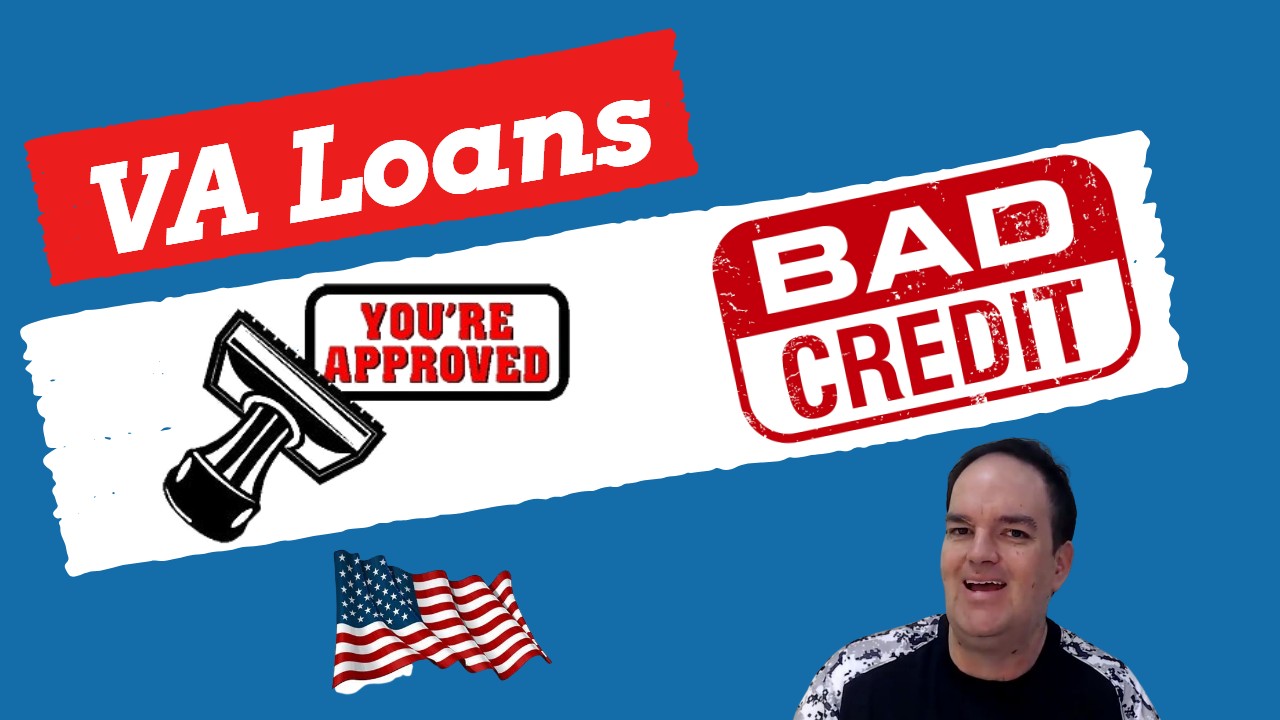

Finance
How To Get VA Loan With Bad Credit
Modified: February 21, 2024
Learn how to secure a VA loan even with bad credit. Our finance experts will guide you through the process and help you get the financing you need.
(Many of the links in this article redirect to a specific reviewed product. Your purchase of these products through affiliate links helps to generate commission for LiveWell, at no extra cost. Learn more)
Table of Contents
Introduction
Welcome to the world of VA loans! If you have bad credit and dream of becoming a homeowner, don’t worry – you’re not alone. Many people think that bad credit disqualifies them from getting a VA loan, but that’s not always the case. In this article, we’ll explore how you can still obtain a VA loan with bad credit and provide tips to increase your chances of approval.
If you’re not familiar with VA loans, they are a type of mortgage loan available to eligible veterans, active-duty service members, and surviving spouses. VA loans offer numerous advantages, including lower interest rates, no down payment requirements, and no private mortgage insurance. These benefits make them an attractive option for those who have served in the military.
Unfortunately, life can sometimes throw financial curveballs that result in a less-than-perfect credit score. This can make getting approved for any type of loan, including a VA loan, more challenging. However, having bad credit doesn’t necessarily mean you’re out of luck. The key is to understand what is considered bad credit in the eyes of lenders and take steps to improve your creditworthiness before applying for a VA loan.
In this article, we’ll dive into what exactly is considered bad credit for a VA loan and provide you with strategies to improve your credit score. We’ll also discuss the steps you can take when applying for a VA loan with bad credit, as well as alternative options if you’re unable to qualify for a VA loan. By the end, you’ll have a clearer understanding of how to navigate the loan process and increase your chances of homeownership.
Understanding VA Loans
Before we delve into getting a VA loan with bad credit, let’s first understand what VA loans are and how they work. VA loans are a special type of mortgage loan offered to veterans, active-duty service members, and eligible surviving spouses. They are guaranteed by the Department of Veterans Affairs (VA), which means that if the borrower defaults on the loan, the VA will reimburse the lender for a portion of the loss.
VA loans offer several advantages that make them an attractive option for those who qualify. One of the main benefits is that they often come with lower interest rates compared to conventional loans. This can result in significant savings over the life of the loan. Additionally, VA loans do not require a down payment, which can be a major financial relief for those who may struggle to save for a large upfront payment.
Another advantage of VA loans is that they do not require private mortgage insurance (PMI). PMI is typically required for conventional loans when the borrower puts less than 20% down payment. Avoiding PMI can save borrowers hundreds of dollars per month on their mortgage payment.
It’s important to note that while the VA guarantees the loan, they do not actually provide the loan. Borrowers still need to qualify and work with a VA-approved lender to secure a VA loan. These lenders have experience with VA loans and understand the unique requirements and benefits associated with them.
Overall, VA loans are designed to provide financial assistance and housing opportunities to those who have served or are currently serving in the military. If you meet the eligibility criteria, a VA loan can be a great option to consider for your home financing needs.
What is Considered Bad Credit for a VA Loan?
When it comes to getting a VA loan with bad credit, it’s important to understand what lenders consider as bad credit. While there isn’t a specific credit score requirement outlined by the VA, most lenders have their own criteria for evaluating creditworthiness. Generally, a credit score below 620 is considered less than ideal for a VA loan.
In addition to the credit score, lenders also review the borrower’s credit history. They look for patterns of late payments, delinquencies, bankruptcies, or foreclosures. These negative marks on your credit report can significantly impact your chances of approval for a VA loan with bad credit.
However, it’s worth noting that lenders will take a holistic approach when assessing your creditworthiness. They will also consider other factors such as your income, employment history, and debt-to-income ratio. So, even if you have a less-than-perfect credit score, there may still be opportunities to secure a VA loan if you can demonstrate financial stability and the ability to repay the loan.
While having bad credit may limit your options, it doesn’t make it impossible to get a VA loan. Lenders understand that life circumstances can lead to financial difficulties, especially for those who have served in the military. They are willing to consider the context of your credit history and may be more lenient if you can provide evidence of positive financial behavior in recent years.
It’s important to be proactive in understanding your credit situation before applying for a VA loan. Obtain a copy of your credit report from the three major credit bureaus – Equifax, Experian, and TransUnion – and carefully review it for any errors or discrepancies. Dispute any inaccuracies you find to improve your credit score.
In the next section, we’ll discuss how to improve your credit score before applying for a VA loan with bad credit.
How to Improve Your Credit Score before Applying for a VA Loan
If you have bad credit and want to increase your chances of getting approved for a VA loan, there are several steps you can take to improve your credit score. While it may take some time and effort, the payoff of a higher credit score can be well worth it.
1. Review and Dispute Errors: Start by obtaining a copy of your credit report from all three major credit bureaus. Carefully review the information for any errors, such as incorrect personal details or accounts that don’t belong to you. Dispute any errors you find to have them removed from your credit report.
2. Pay Bills on Time: One of the most significant factors affecting your credit score is your payment history. Make it a priority to pay all your bills on time, including credit cards, loans, and utilities. Set up automatic payments or reminders to avoid missing any due dates.
3. Reduce Credit Card Balances: High credit card balances can negatively impact your credit score. Aim to keep your credit card utilization ratio below 30%. If possible, pay down or pay off balances to lower your overall debt and improve your credit score.
4. Avoid New Credit Applications: Applying for new credit can temporarily lower your credit score. Avoid opening new credit accounts or taking on unnecessary debt leading up to your VA loan application. Focus on improving your existing credit rather than seeking new credit.
5. Pay Off Collection Accounts: If you have any outstanding collection accounts, work towards resolving them. Paying off or negotiating a settlement for these accounts can positively impact your credit score and demonstrate responsible financial behavior.
6. Establish a Positive Credit History: If you have limited credit history, consider opening a secured credit card or becoming an authorized user on someone else’s credit card. Demonstrating responsible credit usage and making timely payments can help build a positive credit history.
Remember, improving your credit score takes time, so it’s important to start the process well before applying for a VA loan. Monitor your progress by regularly checking your credit reports and scores. By taking these steps, you’ll be on your way to strengthening your creditworthiness and increasing your chances of approval for a VA loan.
Applying for a VA Loan with Bad Credit
Applying for a VA loan with bad credit may seem daunting, but it’s still possible to secure financing for your dream home. Here are some important steps to follow when applying for a VA loan with bad credit:
1. Find a VA-Approved Lender: Start by researching and identifying lenders who are experienced in VA loans and are willing to work with borrowers with bad credit. These lenders will have the knowledge and expertise to guide you through the loan process and explore potential options.
2. Gather Your Financial Documents: Get organized and gather all the necessary documents that lenders will require for your loan application. This may include proof of income, bank statements, tax returns, and documentation of any assets or debts you may have.
3. Be Prepared to Explain Your Credit History: During the loan application process, you may be asked to provide an explanation for any negative marks on your credit report. Be honest and forthright about any instances of financial difficulty, and provide additional context or supporting documents to demonstrate responsible financial behavior moving forward.
4. Consider a Co-Borrower: If your credit is severely damaged, you may want to consider adding a co-borrower to your loan application. A co-borrower with better credit and income can strengthen your application and increase your chances of approval.
5. Provide a Larger Down Payment: While VA loans do not require a down payment, offering a larger down payment can help offset the risk associated with bad credit. If you’re able to save up some funds, consider making a substantial down payment to alleviate concerns of the lender.
6. Demonstrate Stable Income: Lenders want to see that you have a stable source of income to make timely mortgage payments. If you can show consistent employment and a reliable income stream, it can help mitigate the impact of bad credit on your loan application.
7. Be Realistic about Loan Terms: It’s important to set realistic expectations when applying for a VA loan with bad credit. You may have to accept a higher interest rate or pay additional fees to secure the loan. Keep in mind that improving your credit over time can put you in a better position to refinance and potentially secure more favorable loan terms in the future.
Remember, each lender has its own guidelines and criteria for evaluating loan applications, so it’s crucial to shop around and compare offers. Don’t be discouraged if you face some initial rejections – there are lenders who specialize in working with borrowers with bad credit. With perseverance and the right approach, you can still achieve your homeownership goals through a VA loan.
Tips for Getting Approved for a VA Loan with Bad Credit
While getting approved for a VA loan with bad credit may be more challenging, there are several tips you can follow to increase your chances of obtaining financing for your home. Consider implementing the following strategies:
1. Work on Improving Your Credit: Prioritize improving your credit score before applying for a VA loan. Pay your bills on time, reduce credit card balances, and dispute any errors on your credit report. Every little improvement in your credit score can make a significant difference in your loan approval chances.
2. Save for a Larger Down Payment: Saving up for a larger down payment can help compensate for your bad credit. Offering a substantial down payment can demonstrate your commitment to the loan and lower the lender’s risk. It can also help you qualify for a better interest rate and potentially avoid private mortgage insurance (PMI).
3. Seek Professional Credit Counseling: If you’re struggling to improve your credit on your own, consider seeking help from a reputable credit counseling agency. They can provide guidance on how to manage your finances, negotiate with creditors, and create a plan to repair your credit.
4. Provide a Solid Employment History: A stable employment history can strengthen your loan application, even with bad credit. Lenders want to see that you have a consistent income source and are capable of repaying the loan. Stay in your current job or line of work and avoid frequent job changes during the loan application process.
5. Keep Debt-to-Income Ratio in Check: Lenders look at the ratio between your monthly debt payments and your income, known as the debt-to-income ratio (DTI). Try to keep your DTI below 41% to improve your chances of loan approval. Paying off existing debt or increasing your income can help achieve this goal.
6. Work with a VA-Approved Lender: Choose a lender who has experience in working with borrowers with bad credit and VA loans. These lenders understand the intricacies of the VA loan program and can guide you through the process more effectively. They may have more flexibility in evaluating your application and finding the right loan option for your situation.
7. Be Prepared with Documentation: Have all the necessary financial documents ready, including proof of income, tax returns, bank statements, and any additional documents that support your financial stability. Being well-prepared can expedite the loan application process and give lenders a positive impression of your financial responsibility.
Remember to maintain realistic expectations throughout the process. While bad credit may limit your options, it doesn’t mean that homeownership is out of reach. With determination, patience, and the right strategies in place, you can increase your chances of getting approved for a VA loan with bad credit.
VA Loan Alternatives for Borrowers with Bad Credit
While VA loans are a great option for military personnel with bad credit, it’s important to explore alternative financing options if you’re unable to qualify for a VA loan. Here are some alternatives to consider:
1. FHA Loans: The Federal Housing Administration (FHA) offers loans that are often more lenient when it comes to credit requirements. With a minimum credit score of 500, FHA loans can be accessible to borrowers with bad credit. However, keep in mind that FHA loans require mortgage insurance premiums, which can increase your monthly payments.
2. USDA Loans: If you’re looking to purchase a home in a rural area, a USDA loan may be a suitable alternative. These loans, offered by the U.S. Department of Agriculture, have flexible credit guidelines and provide 100% financing for eligible borrowers. However, income and location restrictions apply.
3. State and Local Homebuyer Programs: Many states and localities offer homebuyer assistance programs that can help individuals with low credit scores. These programs often provide down payment and closing cost assistance, making homeownership more accessible. Research programs available in your area and see if you meet the eligibility criteria.
4. Non-Conventional Lenders: There are private lenders and online mortgage companies that specialize in working with borrowers who have bad credit. These lenders may be more flexible in their underwriting criteria and can provide options tailored to your specific financial situation. However, be cautious when considering non-conventional lenders and do thorough research to ensure they are reputable and trustworthy.
5. Improve Your Credit and Reapply: If you’re unable to qualify for a mortgage at the moment, consider taking the time to improve your credit before reapplying. Work on improving your credit score, paying off debts, and demonstrating responsible financial behavior. This can open up more opportunities for better loan terms in the future.
It’s crucial to explore these alternative options and consult with a reputable mortgage professional or housing counselor who can guide you through the process. They can help you navigate the various loan programs, determine your eligibility, and find the best solution to fit your needs and financial circumstances.
Remember, even if you’re unable to secure a loan at this time, it’s essential to continue working on improving your credit. Building a solid financial foundation will increase your chances of obtaining financing in the future and achieving your dream of homeownership.
Conclusion
Obtaining a VA loan with bad credit may present some challenges, but it’s not impossible. By understanding the requirements and taking proactive steps to improve your creditworthiness, you can increase your chances of securing a VA loan for your dream home. Remember the following key points:
1. Understand the VA Loan Process: Familiarize yourself with how VA loans work and the advantages they offer, such as lower interest rates and no down payment requirements.
2. Assess Your Credit Situation: Review your credit report, identify areas for improvement, and take steps to enhance your credit score before applying for a VA loan.
3. Follow Credit Improvement Strategies: Pay bills on time, reduce credit card balances, and be conscientious about maintaining a positive payment history.
4. Seek Professional Help if Needed: Don’t hesitate to seek assistance from credit counseling agencies or mortgage professionals who can provide guidance and support in improving your credit and navigating the loan application process.
5. Consider Alternative Loan Options: If you’re unable to qualify for a VA loan, explore alternative financing options such as FHA loans, USDA loans, or state and local homebuyer programs.
6. Stay Persistent and Patient: Improving your credit and securing a loan takes time. Don’t give up, even if you face initial setbacks. Continue working towards your goal and monitor your progress as you build a stronger credit profile.
Remember, bad credit is not a permanent barrier to homeownership. With perseverance, determination, and the right strategies in place, you can achieve your dream of owning a home through a VA loan or alternative financing options. Take the necessary steps today to set yourself up for success in the future.














